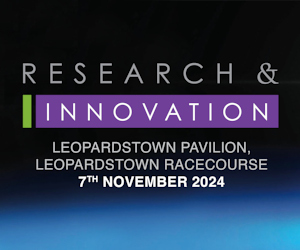EU and Irish Government Decisions on Novel Plant Breeding Techniques Could Consign Irish Agriculture to the Scrapheap of History

Recent decisions by the Irish government and the European Court of Justice with regard to novel plant breeding techniques could consign Irish agriculture to the scrapheap of history, according to UCC scientists Dr Barbara Doyle Prestwich and Dr Eoin Lettice.
The decision (26th July) by the Court of Justice of the European Union ruled that ‘organisms obtained by mutagenesis are GMOs and are, in principle, subject to the obligations laid down by the GMO directive’. However, the court also ruled that only ‘certain mutagenesis techniques’ will fall into this category.
According to Dr Barbara Doyle Prestwich (President of the International Association for Plant Biotechnology): “This is nonsense. Mutagenesis for crop breeding is not new and has a proven safety record. For decades, we have been consuming crops that have been crudely blasted with gamma rays, without any adverse health effects. We now have a newer mutagenesis technique at our disposal (CRISPR/cas) that can do the same thing but in a much more precise way. With its ruling, the ECJ has effectively stymied research in this area, hampered the development of Europe’s bioeconomy and jeopardised food security.”
According to the scientists, the decision earlier in the summer (10th July) by the Irish Government to ‘enable Ireland to prohibit or restrict the cultivation of Genetically Modified Organisms (GMOs) in Ireland’ is also a grave mistake. The proposal brought by Minister Denis Naughton TD (Minister for Communications, Climate Action and Environment) is completely at odds with Ireland’s obligations and ambitions for climate action and it is grossly misleading to equate ‘GMO cultivation-free status’ with ‘green, sustainable food [production]’ which is the basis for which Minister Naughton recommended opting out of growing GM crops in Ireland. This hijacking of the terms ‘green’ and ‘sustainable’ by anti-GMO groupings is not new but is disingenuous to say the least.
“The next generation of gene-edited crops has the potential to cut climate emissions in agriculture and boost global food security. Such crops are far more ‘green’ and ‘sustainable’ than they are given credit for and should be utilised as part of any sustainable food production system, including organic agriculture,” according to Dr Eoin Lettice (IAPB executive member). For example, according to The International Service for the Acquisition of Agri-biotech Applications (ISAAA.org), in 2016 alone, fewer insecticide sprays due to the adoption of GM crops resulted in a reduction of 26.7 billion kilogrammes of CO2 emissions, which is the same as removing 11.9 million cars off the road. According to the UCC scientists, we cannot afford to be complacent in Ireland with respect to climate action and food production. A report in The Irish Times on June 18th highlighted how Ireland was ‘second worst in EU on climate action’ and will not meet EU 2020 commitments thus facing substantial fines.
Dr Doyle Prestwich and Dr Lettice are organising the upcoming International Association for Plant Biotechnology’s (IAPB) congress in the Convention Centre at Dublin’s Spencer Dock next week. The major international meeting will bring together scientists from over 50 countries to discuss and present the latest research findings in the area of plant biotechnology. It offers a unique opportunity to bring the science of GM crops and biotechnology to the fore and to demonstrate the weight of scientific evidence on the safety and economic viability of utilising biotechnology in agriculture.
IAPB 2018 will include speakers on the following topics:
- Dr Shane Morris will discuss the Canadian experience of using cannabis for medicinal purposes.
- Prof Christine Raines will talk about biotechnological approaches to improving photosynthesis and thereby productivity of crops.
- Prof Kevin Folta will talk about how consumers want to use the latest technology in their phones but hark back to The Good Ol’ Days where food is concerned ignoring advances in how technology can help food production.
- ‘Farm Babe’ aka Michelle Miller has been featured on Forbes as one of the biggest and most reputable voices for commercial agriculture on social media. She is a weekly columnist on www.agdaily.com where she regularly debunks popular myths surrounding food and farming. She’ll bring her hands-on experience and lessons learned from the United States to an Irish audience.
- The full programme is available at http://iapb2018.com/
The Congress will bring in approximately 500 world experts who will talk about food security, sustainable methods of food production, crops that can grow in a changing climate, gene editing, use of plants as ‘chemical factories’ for drug production, ways of tackling disease in crops and much more besides. The organisers are confident that by hosting the event in Ireland it will help inform decisions around food production based on sound scientific principles.
CAPTION:
Dr Eoin Lettice and Dr Barbara Doyle Prestwich, School of Biological, Earth and Environmental Sciences, UCC.







